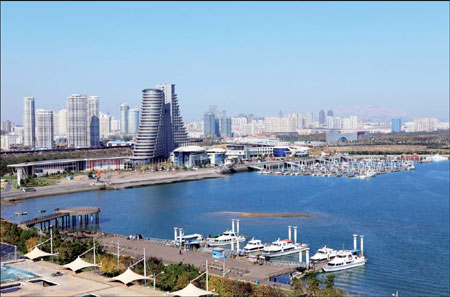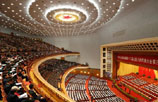Basking in the sun
By Lin Jing and Xie Chuanjiao (China Daily) Updated: 2012-06-15 12:43
|
Location, infrastructure and market potential have attracted 412 foreign companies to invest in the port city of Rizhao in Shandong province. Provided to China Daily |
Foreign businesses are quickly recognizing strength of Rizhao's seaports
Location, location, location. Rizhao, in the southeastern of Shandong province, has it in spades.
The city of about 2.9 million people is smack in the middle of China's eastern coastline, less than 200 km from the seaport of Qingdao and neighboring Lianyungang, a major business hub. With its geographical advantages, the city - whose name comes from an old saying that the city is the first location to see the sun - is fast becoming an attractive city for foreign and domestic companies.
Rizhao achieved a GDP of 121 billion yuan ($19 billion, 15 billion euros) last year and the city government expects its economy to grow by 12 percent annually to reach 200 billion yuan by 2015.
"Rizhao enjoys outstanding location, linking Beijing to the north, Shanghai to the south, Central China to the west and the international markets to the east," says Zhuang Huihai, director of the city's investment promotion bureau.
Covering 5,348 square kilometers of land and blessed with a 168.5-km-long coastline, Rizhao last year attracted $482 million (386 million euros) in foreign investments, according to the bureau - a 13-percent jump from 2010. Fifty-one foreign investment projects have been signed over the past two years in manufacturing, information technology and new energy sectors.
Through 2011, Rizhao has brought in 412 foreign companies from more than 100 countries and regions to set up shop in the city. Government officials are now looking for investment projects that will better utilize its regional advantages, especially to beef up port-oriented industries.
There are two ports, Shijiu Port and Lanshan Port, with 46 berths that can handle ships of 300,000 tons each.
But ports are not the city's only advantages. With its central location, it is within 150 km of three major airports: Qingdao Liuting International Airport, Lianyungang Baitabu Airport and Linyi Shubuling Airport. All are accessible by highways. The city itself will have its own airport in two years.
One foreign company that has caught on early to the potential in Rizhao is De Wild, a private company headquartered in Roosendaal, the Netherlands. The company mostly manufactures and sells gardening machinery, such as wood chippers and lawn mowers.
Kees Bout, general manager at Wild (Rizhao) Garden Machinery Co, the company's branch in China, says De Wild chose Rizhao because of its infrastructure and market potential.
"We checked some areas in China to build our factory, but Rizhao seemed the most attractive because it still has a big future and a lot of potential, while many other areas have already gone through big development," Bout says.
Wild (Rizhao) Garden Machinery Co was established in 2006. During the past three years, annual sales have reportedly grown by at least 20 percent. In 2011, it produced 800 units of wood chippers and about 500 ride-on mowers.
Bout says the New Eurasian Land Bridge, which starts from Lianyungang, runs through China and links to Rotterdam - a distance of 11,870 km - has been a boon to the company's coffers.
De Wild is currently looking to gain a foothold in the gardening and forestry industries in China. So far, Bout says, the Rizhao government has supported every move the company has made.
"From the beginning we got good support and information from the authorities. Combining all these factors together with an economical production environment, Rizhao made it very tempting for De Wild to make its investments," Bout says.
Yang Jun, secretary of the Rizhao Party committee, says attracting foreign companies has been a point of emphasis for the city. The party secretary says the city has established six teams of officials specializing in various major industries to help lure investments.
Dohler Group, a Germany-based producer of fruit juice concentrates and flavors, is one such investor. The company acquired Sanchuan Rizhao, a local producer of apple juice, in 2009 and established its second production facility in China in Rizhao. The other facility is in Jinan, capital of Shandong province.
Zong Xuge, general manager of Dohler Food & Beverage Ingredients Rizhao Co, says Rizhao provides many transportation outlets for Dohler, which exports more than 90 percent of its products overseas.
"For a fruit manufacturer as Dohler, the convenient transportation with Qingdao and other regions ensures that we can have a timely delivery," he says.
Sales reached 180 million yuan ($28 million, 23 million euros) in 2010 and grew to 250 million yuan in 2011. The company plans to invest at least 100 million yuan next year to double its production capacity.
"Rizhao will be a key production location for Dohler's China business," Zong says.
Still, Bout has some concerns about whether Rizhao will be able to sustain its competitiveness. He says there must be better cooperation between small and medium-sized local suppliers with foreign companies.
"Furthermore I hope that prices in Rizhao will not rise too much and that traffic jams, which we already have a bit, and smog will not become a part of daily life like in many other areas in China," he says.
One way in which Rizhao will stay competitive, experts say, is by expanding on trade at the ports. Port-oriented businesses, such as pulp and paper production, have developed quickly in recent years.
In 2011, 38 major port-oriented enterprises totaled 123.7 billion yuan in revenue, which accounts for 49.2 percent of all major enterprises in the city with an annual revenue of more than 20 million yuan.
Xu Guangli, a corporate communications manager at Shandong Asia Pacific SSYMB Pulp & Paper Co, says that the company has benefited a lot from Rizhao's ports.
"Pulp production has a high requirement for fast transportation and logistics and need a large port with high capacity. While in Rizhao, our factory is only 800 meters from the port. Wood chips can be transferred and processed in the factory as soon as possible," Xu says.
The company is a member of the Asia Pacific Resources International Ltd, a leading global producer of fiber, pulp and paper.
After acquiring a Rizhao pulp and paper mill in 2005, Asia Pacific Resources has invested 15 billion yuan in the city. It currently has a 2-sq-km factory and employs 1,500. The company's sales topped 8.9 billion yuan last year and are expected to reach 9.5 billion yuan this year.
Xu says that the city's infrastructure and improving investment environment has cultivated a particular advantage for Rizhao.
The company plans to invest another 30 billion yuan to expand its production area to 3.35 sq km and upgrade its facility to produce more products, such as paper for packaging. After the expansion, which starts this month, its Rizhao production facility is expected to be the largest paper mill in China.
Xu estimates that the company will produce 6 million tons of products with sales of more than 30 billion yuan a year.
"The geographic location and transportation facilities make it convenient to ship our products to Southeast Asia and for raw material supply in Shandong province," he says.
Contact the writers at linjingcd@chinadaily.com.cn and xiechuanjiao@chinadaily.com.cn
- Airlines cut flights to South Korea as China steps up MERS alert
- Former Chinese top legislator Qiao Shi dies in Beijing at age 91
- Mainland to lift entry-permit policy for Taiwan residents
- Polling shows viable candidate in Taiwan election
- Entry permit regulation lifted for Taiwan visitors
- Nation's first yoga college set up
- Cruise ship death toll revised to 442 as search and rescue efforts end
- Palace Museum adopts visitor registration
- 2 dead, 1 missing in second Guizhou collapse in a week
- Qiao Shi, champion of rule of law, dies







